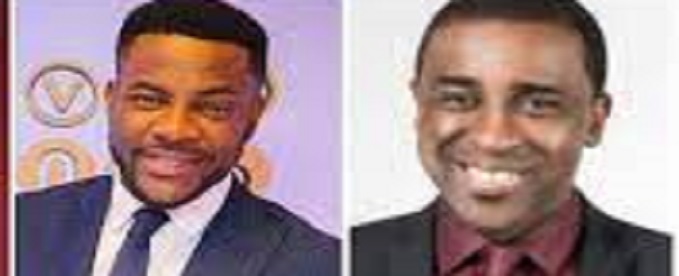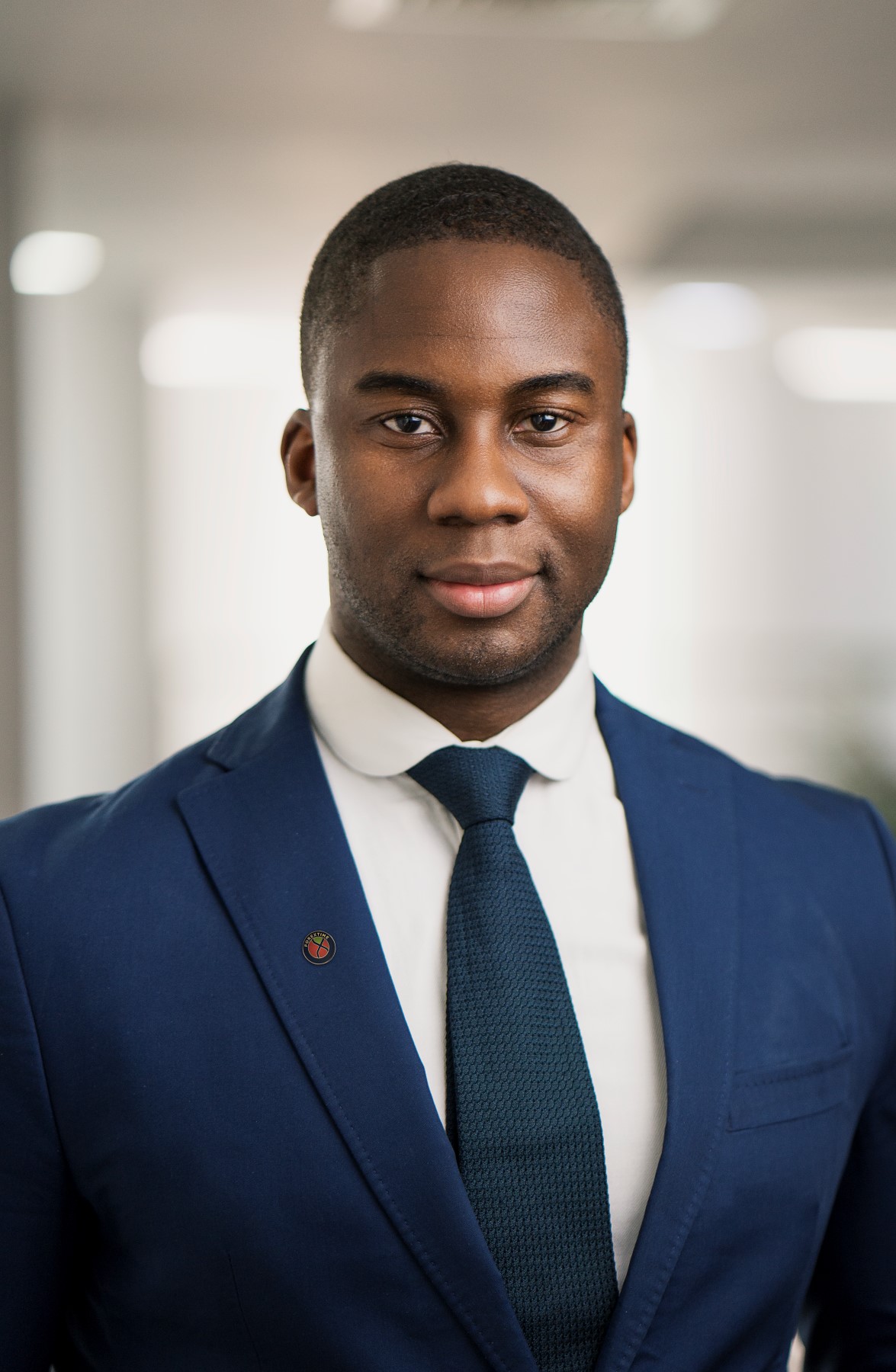Broadcasting
Ebuka, Edoho Fans Fight on Social Media over Choice of Host for BBNaija

Fans of Big Brother Naija, the popular television reality programme are fighting in the social media over who to host the show later in the year.

Ebuka and Frank
This is coming as the sixth season of the Big Brother Naija show returns.
While some fans want an alumnus of the Big Brother Naija maiden edition in 2006, Ebuka Obi-Uchendu, to retain his seat as the host of the show, other devotees of the programme desire a fresh wine in the person of Frank Edoho, who was host of popular Nigerian TV show, ‘Who wants to be a Millionaire’.
BBNaija, which makes a return for a sixth season later this year, has already topped previous seasons as MultiChoice Nigeria announced a grand prize of N90m.
BBNaija hopefuls, who are 21 years or older and of Nigerian nationality with valid passports, will get an early audition when they pay for the DStv Premium, Compact Plus, Compact, Confam, Yanga package or on GOtv Max or Jolli package between March 24 and March 31, 2021, MultiChoice said.
The #BBNaijaEarlyAccess online auditions will also require interested participants to make a two-minute video stating why they should be picked to be housemates, the company added.
But prior to the auditions, lovers of Edoho and Ebuka, on Friday, clashed on social media, calling on the organisers of the event to bring their man in as host for the 2021 show.
A tweep, @iamkelgrin, seemed to have ignited a social media war when the user wrote, “Ebuka don eat small, make him allow another person chop! Frank Edoho as BBNaija host for this season won’t be a bad choice though. Eviction night go choke gan!”
A barrage of criticisms and divergent views thus followed the tweet with Edoho urging fans to let Ebuka remain as the presenter of the show.
Edoho, who replied to @iamkelgrin’s tweet, wrote, “What did Ebuka do to deserve all this? Why would you want to change someone that has done a show successfully for only 3 years and have him replaced with one who did WWTBAM for 13 years? Leave Ebuka alone! Please.”
A tweep, @UncleMaazi, also wondered, “The sudden hate on Ebuka is what I don’t get!”
“If Ebuka stops hosting BBN, I don’t think the show would ever remain the same anymore,” @Preciouschee submitted.
@Chines_zoe sent “thunder to fire” those who want the fashionable Ebuka replaced while @OluSaltz said Edoho was right but “deep down I prefer you over Ebuka due to your suspense.”
“We are not saying he (Ebuka) did something wrong. All we are saying is we just want to get another flair. Ebuka is good no doubt,” @chykeobrain stated.
@Daddy_Nomso, however, agreed with the ex-presenter of ‘Who wants to be a Millionaire’, saying, “Frank worked for 13 years without being replaced and we still miss him on our screens, why would anyone want to replace Ebuka who is doing a good job and is just three years into it? Allow him enjoy his reign for as long as it lasts.”
Broadcasting
How Flavour’s Uplifted Album Changed the Game: 15 Years of Igbo Pride and Global Hits

Fifteen years ago, something truly special dropped onto the music scene: Flavour N’abania’s second album, Uplifted. This was a first showcase of his talent. With powerful vocals, masterful highlife production, and a deep connection to his cultural roots, Uplifted solidified Flavour’s reputation as a gifted artist.

At the time of its release, Uplifted smashed through borders and cultural divides, all thanks to Flavour’s deep commitment to celebrating his Nigerian roots, especially his Igbo heritage. This powerful connection to his culture has made him a major force, not just in Nigeria, particularly in the East, but also among the Igbo community dotted around the world.
The sheer success of Flavour’s cultural expression is highlighted by Spotify data from Uplifted and his other tracks. Even though his songs are deeply rooted in his culture and often sung in Igbo, they’re getting massive plays all over the globe.
Uplifted itself has stayed a big deal on streaming platforms, with its standout tracks racking up some serious numbers. Among the most-streamed hits from the Uplifted album are Ashawo Remix, Adamma, and Oyi (I dey Catch Cold). These tracks, along with other timeless fan favourites like Time To Party, Nwa Baby (Ashawo Remix), and Game Changer (Dike) have all contributed significantly to Flavour’s overall streaming success, proving their lasting appeal. Reflecting on the album’s anniversary during an exclusive chat with Spotify, Flavour revealed that for him, “Adamma” truly captured the essence of Flavour from the Uplifted album era.”
From the heart of Nigeria to global playlists: Flavour’s universal pull
Flavour’s music really does have a universal pull. His songs have popped up in over 2 million user-made playlists, which shows just how much people are connecting with and sharing his tunes. And get this: in the last three years, from 2022 to 2024, Flavour’s music has seen a growth in streams, a total stream increase of 134% globally, and a 573% increase across Sub-Saharan Africa.
While 51% of his total audience is in Nigeria, his influence stretches far and wide with the USA, UK, Canada, South Africa, and France all among his top listening countries. That’s a truly global footprint, reaching across Africa, Europe, and America.
Leading Flavour’s listenership in Nigeria is a strong showing from Lagos, accounting for 38% of his Nigerian audience. The Federal Capital Territory (FCT) and Rivers State also follow closely, making up 22% and 16% respectively, together claiming 76% of his Nigerian audience. He also enjoys love in the east as two Eastern Nigerian cities, Enugu and Onitsha, break into his global top 10. Big international cities like Greater London, Johannesburg, and New York City feature prominently too. This wide geographical spread shows how his music crosses all sorts of borders.
Who’s listening? A look at Flavour’s fanbase
Flavour’s audience is diverse with Gen Zs (18-24 year olds) as his biggest fans globally and across Sub-Saharan Africa. This strong youth appeal is vital for his long-term success. While his music celebrates women, men form the majority of his listeners globally (57%) and in Sub-Saharan Africa (63%).
The lasting success of Uplifted highlights how digital streaming has completely changed the music industry. Platforms like Spotify have given artists like Flavour ways to connect with fans everywhere. These days, streaming data gives us a clear, numbers-based look at an artist’s reach, showing that Flavour’s cultural stories, delivered in fluent Igbo, truly resonate far beyond Nigeria’s borders.
Flavour’s strong link to his Igbo roots, seen in his music, has driven his global success, acting as a cultural bridge for Nigerian traditions. The ongoing popularity of Uplifted and his other songs on streaming platforms proves that genuine cultural expression, mixed with great artistry, ensures lasting success today. As Uplifted hits 15 years, it showcases the power of culture worldwide.
Broadcasting
Nigeria Week Ahead: CBN decision, ECB and USD in focus

By Lukman Otunuga, Senior Market Analyst, FXTM
This will be a week defined by high-impact events and corporate earnings from the largest companies in the world.

Nigeria’s central bank is expected to hold interest rates on Tuesday.
This decision is likely based on still stubbornly high inflation despite price pressures easing in recent months. Inflation slowed to 22.2% year-on-year in June, its third consecutive decline. A CBN rate cut could be on the cards in H2, but this will be on the back of persistently falling price pressures.
Looking at the NGX All Share Index, it has gained almost 10% month-to-date – pushing 2025 gains to nearly 30%. This means the NGX is currently outperforming the S&P500 and Nasdaq100 who have gained roughly 7% and 11% this year respectively. The Naira spot has held its ground against the USD this year after depreciating almost 70% in 2024.
Outside of Nigeria, earnings season is in full swing with US banks reporting strong results last week. Now the spotlight shines on big tech with Alphabet and Tesla reporting on Wednesday.
Alphabet shares gained 14% in Q2 amid strong AI product demand and growth in the cloud business. However, bulls may need a fresh catalyst to push Alphabet’s year-to-date gains out of the red. Tesla is down almost 20% year-to-date and could extend losses if its latest quarterly results are below market expectations
On the data front, key releases from Europe, the United Kingdom, Japan, and the United States may influence global sentiment.
But the main event for FX markets could be the European Central Bank decision on Thursday. No changes are expected to interest rates, but any clues offered on future moves could spark fresh volatility. Traders are currently pricing in a less than 50% probability that the ECB cuts rates by September
Speaking of FX, the dollar has weakened across the board with the DXY tumbling toward 97.70. This weakness could be based on mounting pressure from Trump to cut US rates and caution ahead of the tariff deadline on August 1st.
Note: Nigeria faces a 14% reciprocal tariff on its goods imported into the U.S, effective from August 1st.
Broadcasting
Big Brother Naija Season 10 to Premiere July 26 with Record ₦150m Grand Prize

MultiChoice Nigeria, today announced the highly anticipated return of Africa’s biggest reality television show, Big Brother Naija, for its landmark 10th season. Set to premiere over two nights on Saturday, July 26 and Sunday, July 27, 2025, the new season promises 10 weeks of captivating drama, strategic gameplay, and unparalleled entertainment, culminating in the grand finale on Sunday, October 5, 2025.

The audition process for this milestone season was meticulously designed to unearth the most engaging and dynamic personalities from across Nigeria. Audition registrations were held from May 3rd to May 7th, 2025, and saw an overwhelming response, followed by rigorous in-person auditions conducted in Lagos, Abuja, and Enugu from May 16th to May 18th, 2025.
Speaking on the upcoming season, Busola Tejumola, Executive Head, General Entertainment, MultiChoice Group, expressed her excitement: “Today we are not just announcing another season, we are celebrating a legacy.”
While the official theme for Season 10 will be unveiled on the premiere night, viewers can anticipate a fresh wave of excitement. The beloved Ebuka Obi-Uchendu is returning as host, guiding viewers through every twist and turn of the season. This 10th season also has the highest prize at stake – valued at a whopping N150million.
Fans can catch the premier live on July 26 and 27 exclusively on Africa Magic Showcase, Family and Showmax at 7 PM WAT. The Sunday live eviction shows will also air exclusively on these channels. The 24/7 live stream will be available on DStv Channel 198, GOtv Channel 49, and on Showmax.
“BBNaija has become more than just a television show; it is a living, breathing cultural force. It has given voice to a new generation of talent, creatives, entertainers, and the influencer community, and it has refined what homegrown entertainment can achieve when it is done at scale with intention and ambition,” added Tejumola.
With a two-night opening live show for Big Brother Naija Season 10, the season is poised to build upon the legacy of its predecessors, with fans expecting a more dynamic and entertaining experience. Still speaking on what the season holds Dr. Tejumola said “Today we are not just announcing another season, we are celebrating a legacy. From the very first time we introduced Big Brother Naija in 2017, we had an inkling that we had something special. What we couldn’t fully imagine then is how deeply the show would resonate not only in Nigeria but across Africa and in the global diaspora, where our stories continue to connect people to home.”
This milestone season for the iconic show is not without the usual lineup of sponsors. The gold sponsor for the 10th season of the show is Guinness Nigeria. Other sponsors include Smirnoff, Gordons, HFM, Pepsi, Aquafina, Supakomando, Tolaram Group, Bet King, Golden Penny Foods, Haier Thermocool, Checkers custard, and Innoson Motors, among others.
Viewers can catch all the live action and special broadcasts on DStv Channel 198, GOtv Channel 49, and Showmax. The live Sunday eviction shows will air exclusively on Africa Magic Showcase (DStv Channel 151, GOtv Channel 8), Africa Magic Family (DStv Channel 154, GOtv Channel 7) and on Showmax.
DStv and GOtv subscribers can also watch the show on the go using the DStv and GOtv Stream apps available on the Google Play Store and IOS App Store.

 E-Financial3 days ago
E-Financial3 days agoUBA’s LEO Becomes Africa’s First Chatbot to Enable Cross-Border Payments

 News3 days ago
News3 days agoUN Appoints Sa’id, Nigerian to Nuclear Panel

 E-Business3 days ago
E-Business3 days agoNIMC Enrolls 122m for NIN, Cuts Extortion by 40 Percent

 Telecom2 days ago
Telecom2 days agoMTN Nigeria Rewards 1,500+ Winners with ₦290m in Mega Billion Promo

 Telecom3 days ago
Telecom3 days agoMTN Urges Nigerian to Regards Telecom Infrastructure as National Assets

 General News3 days ago
General News3 days agoAppeal Court Nullifies Registration of ‘KPMG Professional Services’

 E-Financial2 days ago
E-Financial2 days agoNaira Slides Again, Hits ₦1,532.34/$ Despite CBN’s Dollar Push

 Telecom3 days ago
Telecom3 days agoBitget Launches $6M Global Crypto Trading Contest with New Competitive Segments
























